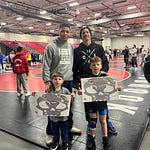🔥Welcome to Volume #00103!🔥
I’m Christian Champ. This is ☯️The Middle Way Newsletter ☯️. It is a place where I write, explore, share, and invite you along for the journey.
If you enjoy the newsletter, please share it with your friends.
🌊Why Viewing Life as a Long Unfolding Is a Super Power We Want to Harness!🌊
Lying on my board, I felt a shiver of amazement tingle through my body.
The sunlight began to peak out of the jungle trees.
Our paddle out synched with the rising of the sun.
I felt thankful, given the gift of a couple of days of trying to ride the power of the ocean.
I remained in the ready position with friends flanking me on the left and right and our surf coach, Jordy, sitting between us.
As we waited for an invitation to ride a wave, I reflected on the randomness that led me to the Pacific Ocean.
I kept thinking about how life is constantly unfolding.
The events that change us and the world swoop in like waves, pushing us to new frontiers.
My buddies who sat in the water with me helped lead me to this place.
I met my buddy Jon at a credit conference in Detroit, a friendship that created an annual surfing trip to Nosara, Costa Rica.
My buddy Tony went to college with me, but we didn't keep in touch, minus a connection on Facebook. Then we ran into each other at a JP Morgan High Yield Conference, talked surfing, and here we are.
Our surfing coach, Jordy, and I met twice, once through another buddy and again through Tony. We spend a week together yearly, with him helping me find good waves and seeing what happens. Then we watch videos of my surfing to help me course correct.
The weird unfolding of recent events led my family and me to travel to Nosara for the past four years. The entire crew hangs out on the beach, and even the little dudes jumped on a board this year.
None of us planned for it; it all unfolded.
When we view life through the lens of unfolding, we can let go of our predetermined outcomes. We get to see all that life offers us and take a broader lens.
We can get better at letting life unfold by doing these five things.
#1 Remember Journey First
Surfing is a perfect encapsulation of the unfolding of life. We show up and don't know what the ocean will provide. The waves can be too small, too big, and smash us or perfect.
We don't know how it will play out until we show up.
Each ride shows up as a mystery for us to figure out. We don't know what to do until we get on the wave. Then we need to pay close attention to what the wave offers us.
We know that we move around the water and can't predict where we end up or what transpires.
We get to enjoy the journey instead of fixating on the outcome. We remember there is no finish line and wonder what will happen next.
#2 Ready Position
We need to be ready for when things unfold. Life is a choose-your-own-adventure, but we don't always get to decide when the choices happen.
When it is our turn to move, we must be ready.
We stay ready for when the waves show up. We paddle out and wait. We watch the ocean to see what comes to us. We can't force anything beyond increasing our ability to see the waves, position for waves, and improve our ability to paddle into the waves.
We sit ready. If it's a perfect wave, we jump on it. If it's a wave that will break on us, we hopefully get out of the way before we get thrashed.
#3 Steering
We get to steer, but we don't control the road.
We have agency and get to create affordances, but life keeps happening. We practice our steering to float through the easy moments and hold it together during the challenging moments.
We grip the wheel tightly when needed and learn to relax into the turns after we get the hang of things.
Sometimes we fall out of the pocket and wait for the next moment to take us.
#4 Our Stories Matter
Our stories about the unfolding are more potent than the unfolding.
The unfolding superpower is harnessed and contained in the stories we tell.
Things happen to us, or we take agency and help push them along.
We can tell stories to make us resilient and anti-fragile, or we can tell them to make us fragile. We can make them empower us and push us. We can tell them to make us give up, not start or quit.
We want to tell the stories that create the world we want to live in. We want to tell stories that create the us that we want to exist in the world.
#5 Remember, Life Doesn't Stop Happening
Life is like the waves in the ocean, constantly changing and constantly happening.
The big moments can come in sets. They can happen in one-off mega-events. It can show up as a slow grind of change so that we don't even notice our transformation and the change around us.
When we sit in the unfolding, we ride waves, wait for waves, and notice when we get swept up in the waves.
We keep our equilibrium as much as possible. We hang on to the middle way without getting tossed into the polarities.
We learn from challenging situations. They make us stronger. We are grateful for the moments when we get to surf and the day when we get food poisoning and miss one of our days of surfing in paradise.
When the moments happen, we ride them as best we can. When food poisoning hits, we push on and hit the beach to let our younger kids and older kids do their thing.
What happens when we step back and view it all as an incredible unfolding?
When we fall off the wave or our wave ends, we paddle back out to find the next one.
When it appears we won or lost, knowing it only continues to unfold unlocks our power within.
🧠Things to Think About🧠
Graham Duncan on Finding a Good Coach
Graham notes Professor Bob Kegan’s observation that coaches can be measured on their ability to challenge and support.
Graham sees coaches offering support but not enough challenge.
Whether you are a coach, a parent, a teacher, or a manager, we need to ask how we can challenge and offer support.
Like finding a flow state (the right balance of challenge to skills), we need to find the right level of challenge/support for our clients, colleagues, and kids.
I often think about what criteria you should use to select a coach. Years ago, I spoke to Bob Kegan, a professor at the Harvard school of Education and one of the, if not the, foremost thinkers in adult development, who himself has coached partners at fancy management consulting firms. We were puzzling through why Josh Waitzkin is so unusually effective at coaching high performers to achieve greater heights, and Bob observed that a coach can be measured on two fundamental dimensions: challenge and support.
In my sample of roughly 200 coaches, the vast majority are an 8 or 9 on support, and a 3 or 4 on challenge. I suspect the same dominant phenotype is found among therapists and shrinks. What distinguishes Waitzkin and the handful of the other extraordinary coaches I’ve encountered is they are a “10” on support AND a “10” on challenge. When you interact with a coach in this category, it’s like a really good emotional and mental work-out — they’re pushing you hard, in a loving way.
Drew Maggi Gets Called Up to the Majors (Pittsburgh Pirates) After 13 Years in the Minors
I love the story of anyone that keeps grinding for what they want, it appears to never show up, and then it happens.
Maggi breaks down his train of thought for continuing to chase his dream
"I always believed this moment would come," Maggi said. "There was a little bit of me that was like, 'You know what? You love playing baseball. Keep going no matter what.' Crazy things happen in this game. So, I'm very thankful that I'm here and that I get to enjoy this. I'm excited for the day."
The manager’s speech and the team’s reaction are priceless.
Altoona manager Callix Crabbe announced Maggi's recall in a video the Pirates shared on Twitter.
"It with great pleasure that I get to promote my first person to the major leagues, someone that is tremendously important to this group and someone that exemplifies grit," Crabbe said in the video.
Maggi, in tears at his locker stall, received a round of applause and several hugs from teammates.
Maggi got an at-bat for the Pirates, creating an emotional moment and many tears in the locker room. Later he got his first two hits and created a similar reaction.
We all relate to the struggle and appreciate it when someone finally climbs to the top of their hill after years of trying.
That is why when we love something, we need to keep going.
🎧Things to Listen, See, and Watch 🎧
Rafe Kelly Talking Parkour and Rough Play with Jordan Peterson
A buddy recommended this episode because Rafe’s kids practice BJJ, and we share similar views on parenting and play (always more play, please). Jordan’s stuff can be controversial, but this podcast avoided anything political.
Rafe’s Evolve, Move, and Play podcast is regularly in my podcast rotation.
Podcast Notes
Rafe was unschooled by his dad because he had ADHD and dyslexia, but his parents fought, and his mom had him back in school.
He acted out until, at age 6 he started doing martial arts and learned to regulate his emotions. Eventually, leading to a mentor home-schooling him starting in the 4th grade.
Two hours of school work and the rest of the day for play, including rough and tumble play, as the physical practices helped transform him.
Started taking care of kids in the neighborhood at 13 and realized they lacked rough-and-tumble play.
Rough play teaches you how to dance and move with someone, which is the building ground for happiness.
When you don’t know how to rough and tumble play, you can hurt people, but it’s only because you don’t know how to do it.
Doing rough play right brings you right to the edge and creates a deeply embodied knowledge on top of emergent reflexes for motor control ….you can integrate all this into a dance.
The highest art of mastery is turning obstacles into opportunities (creating affordances)
His kids started training BJJ at four, and when they wrestle with kids, they have to watch because other kids are poorly regulated and not ready for choke holds.. roughing with kids who don’t know how can mess up their emotional regulation.
His kids won’t respond to getting pushed by bigger kids due to their training. The same training helps you bring fights to an end because you built those capabilities.
Kids make more friends when they can play on the edge and can play as peers.
You can’t see the meaning in the world if you can’t act it out. Rough and tumble play allows us to map the different potential meanings of touch. We lose that mapping when we don’t engage in this type of play. We see that with adults on the edge of their seat when this play happens because they lost that mapping or have low-resolution maps and don’t see a difference between healthy play and violence.
Rafe runs a movement class, and women tend to have the most profound experiences from roughhousing. Most bought into culture’s story of you can’t engage in rough and tumble play, and there are few spaces to practice it. When they practice with Rafe, it changes how they see gender differences.
Screen substituting for rough-and-tumble play is a huge problem. Screens take us away from running, jumping, moving, and being alive.
We need to invite people back into the body. He likes parkour to help create that outcome.
We need to get into the perspectival, participatory, and procedural to get into the body.
We need to play with our kids. We need to have reciprocal play with others.
We need laughter in relationships which creates safety and joy.
Our role as parents is to slowly eradicate unnecessary fears and make our kids more resilient.
If Rafe’s kids try to do something he is afraid of, he doesn’t say don’t do that or be careful; he asks, “How can I help you”
His son wanted to do a backflip on the ground, and he asked to give some drills to prepare him for it. He had to ultimately walk away, letting him do it and not getting in his process.
💣Words of Wisdom💣
"To best support skill acquisition, we need to change the conception of a coach from an instructor (I have the correct solution, and I am here to give it to you) to that of a designer and guide. An effective coach should attempt to design practice environments that foster exploration and promote self-organization rather than prescribing a solution to an athlete." (Rob Gray, How We Learn to Move a Revolution in the Way We Coach Practice Sports Skills)
"When it comes to our actions, disorder and distraction are death. The unordered mind loses track of what’s in front of it—what matters—and gets distracted by thoughts of the future. The process is order, it keeps our perceptions in check and our actions in sync. It seems obvious, but we forget this when it matters most." (Ryan Holiday, The Obstacle Is the Way)
"How many parents have endured hours of battle with their children that could have been resolved in no time at all had they only asked, “Can I change something about me to meet your needs? How can I be better for you?”" (Shefali Tsabary, The Awakened Family)
“There are people who prefer to say ‘Yes,’ and there are people who prefer to say ‘No,’” Keith Johnstone writes. “Those who say ‘Yes’ are rewarded by the adventures they have. Those who say ‘No’ are rewarded by the safety they attain.” (Daniel H. Pink, To Sell Is Human)
"You have to be true to yourself; you have to know your strengths and limitations and live within your means. The same is true for a business. The sooner a company tries to be what it is not, the sooner it tries to “have it all,” the sooner it will die." (Yvon Chouinard, Let My People Go Surfing)
"So how do you motivate yourself? The short answer is by changing your circumstances." (Ayelet Fishbach, Get It Done)
"Today, the arts are also increasingly rendered profane and disenchanted. Magic and enchantment – the true sources of art – disappear from culture, to be replaced by discourse." (Byung-Chul Han and Daniel Steuer, The Disappearance of Rituals)
"One of the most compelling things you can do after asking a question is to genuinely listen to the answer. Stay curious, my friend." (Michael Bungay Stanier, The Coaching Habit)
"Things are not what they seem: Much of what most people think is treasure is, in fact, trash. And much of what they think is trash is, in fact, treasure." (Meb Faber, The Best Investment Writing)
"We suffer for the simple reason that suffering is biologically useful. It is nature’s preferred agent for inspiring change." (Mark Manson, The Subtle Art of Not Giving a F*ck)
"Because here's the big truth: there are many versions of you, and they are all "right."" (Bill Burnett and Dave Evans, Designing Your Life)
"Begin the journey without hope of getting ground under your feet. Begin with hopelessness." (Pema Chödrön, When Things Fall Apart)
"A key component of high-level learning is cultivating a resilient awareness that is the older, conscious embodiment of a child’s playful obliviousness." (Josh Waitzkin, The Art of Learning)
🙏Thanks for Reading🙏
How can you better let things unfold?
What does it feel like when you view life an a great unfolding?
Namaste,
Christian















Share this post